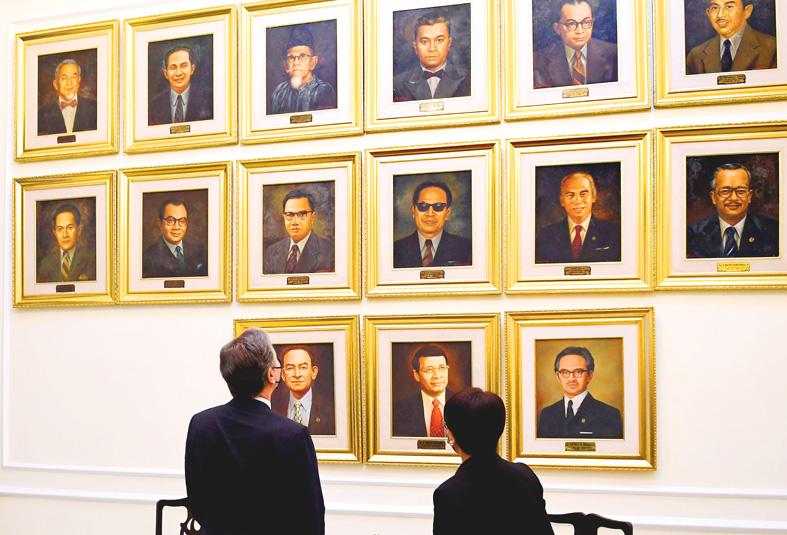The US is to expand its military and economic relationships with partners in Asia to push back against China’s increasing assertiveness in the Indo-Pacific region, US Secretary of State Antony Blinken said yesterday.
Blinken said that US President Joe Biden’s administration is committed to maintaining peace and prosperity in the region and would do that by boosting US alliances, forging new relationships and ensuring that the US military maintains “its competitive edge.”
“Threats are evolving. Our security approach has to evolve with them. To do that, we will lean on our greatest strength: our alliances and partnerships,” Blinken said in a speech in Indonesia, outlining the Biden administration’s Indo-Pacific plans.

Photo: AFP
“We’ll adopt a strategy that more closely weaves together all our instruments of national power — diplomacy, military, intelligence — with those of our allies and partners,” he said.
That would include linking US and Asian defense industries, integrating supply chains and cooperating on technological innovation, he said.
Later, he signed a series of three agreements with Indonesian Minister of Foreign Affairs Retno Marsudi, including one that extends until 2026 an existing maritime cooperation pact that among other issues calls for enhanced joint US-Indonesian naval exercises.
“It’s about reinforcing our strengths, so we can keep the peace, as we have done in the region for decades,” he said.
Blinken insisted that the US is not trying to force countries to choose between the US and China, or seeking conflict with China.
However, he laid out a litany of complaints about “Beijing’s aggressive actions” from “Northeast Asia to Southeast Asia and from the Mekong River to the Pacific islands.”
Chinese Ministry of Foreign Affairs spokesman Wang Wenbin (汪文斌) told a daily briefing that Blinken’s latest comments showed that the US is contradicting itself by “playing up the so-called China threat on the one hand, while claiming that it has no intention to seek conflict with China on the other.”
Blinken is in Indonesia on the first leg of a week-long, three-nation tour of Southeast Asia that is also to take him to Malaysia and Thailand.
Countering China’s growing aggressiveness in the region — particularly against Taiwan, in the South China Sea and in Hong Kong — is prominent on his agenda.
“Countries across the region want this behavior to change,” he said. “We do, too.”
“We are determined to ensure freedom of navigation in the South China Sea,” he said. “It is also why we have an abiding interest in peace and stability in the Taiwan Strait.”

A magnitude 7.0 earthquake struck off Yilan at 11:05pm yesterday, the Central Weather Administration (CWA) said. The epicenter was located at sea, about 32.3km east of Yilan County Hall, at a depth of 72.8km, CWA data showed There were no immediate reports of damage. The intensity of the quake, which gauges the actual effect of a seismic event, measured 4 in Yilan County area on Taiwan’s seven-tier intensity scale, the data showed. It measured 4 in other parts of eastern, northern and central Taiwan as well as Tainan, and 3 in Kaohsiung and Pingtung County, and 2 in Lienchiang and Penghu counties and 1

FOREIGN INTERFERENCE: Beijing would likely intensify public opinion warfare in next year’s local elections to prevent Lai from getting re-elected, the ‘Yomiuri Shimbun’ said Internal documents from a Chinese artificial intelligence (AI) company indicated that China has been using the technology to intervene in foreign elections, including propaganda targeting Taiwan’s local elections next year and presidential elections in 2028, a Japanese newspaper reported yesterday. The Institute of National Security of Vanderbilt University obtained nearly 400 pages of documents from GoLaxy, a company with ties to the Chinese government, and found evidence that it had apparently deployed sophisticated, AI-driven propaganda campaigns in Hong Kong and Taiwan to shape public opinion, the Yomiuri Shimbun reported. GoLaxy provides insights, situation analysis and public opinion-shaping technology by conducting network surveillance

‘POLITICAL GAME’: DPP lawmakers said the motion would not meet the legislative threshold needed, and accused the KMT and the TPP of trivializing the Constitution The Legislative Yuan yesterday approved a motion to initiate impeachment proceedings against President William Lai (賴清德), saying he had undermined Taiwan’s constitutional order and democracy. The motion was approved 61-50 by lawmakers from the main opposition Chinese Nationalist Party (KMT) and the smaller Taiwan People’s Party (TPP), who together hold a legislative majority. Under the motion, a roll call vote for impeachment would be held on May 19 next year, after various hearings are held and Lai is given the chance to defend himself. The move came after Lai on Monday last week did not promulgate an amendment passed by the legislature that

AFTERMATH: The Taipei City Government said it received 39 minor incident reports including gas leaks, water leaks and outages, and a damaged traffic signal A magnitude 7.0 earthquake struck off Taiwan’s northeastern coast late on Saturday, producing only two major aftershocks as of yesterday noon, the Central Weather Administration (CWA) said. The limited aftershocks contrast with last year’s major earthquake in Hualien County, as Saturday’s earthquake occurred at a greater depth in a subduction zone. Saturday’s earthquake struck at 11:05pm, with its hypocenter about 32.3km east of Yilan County Hall, at a depth of 72.8km. Shaking was felt in 17 administrative regions north of Tainan and in eastern Taiwan, reaching intensity level 4 on Taiwan’s seven-tier seismic scale, the CWA said. In Hualien, the